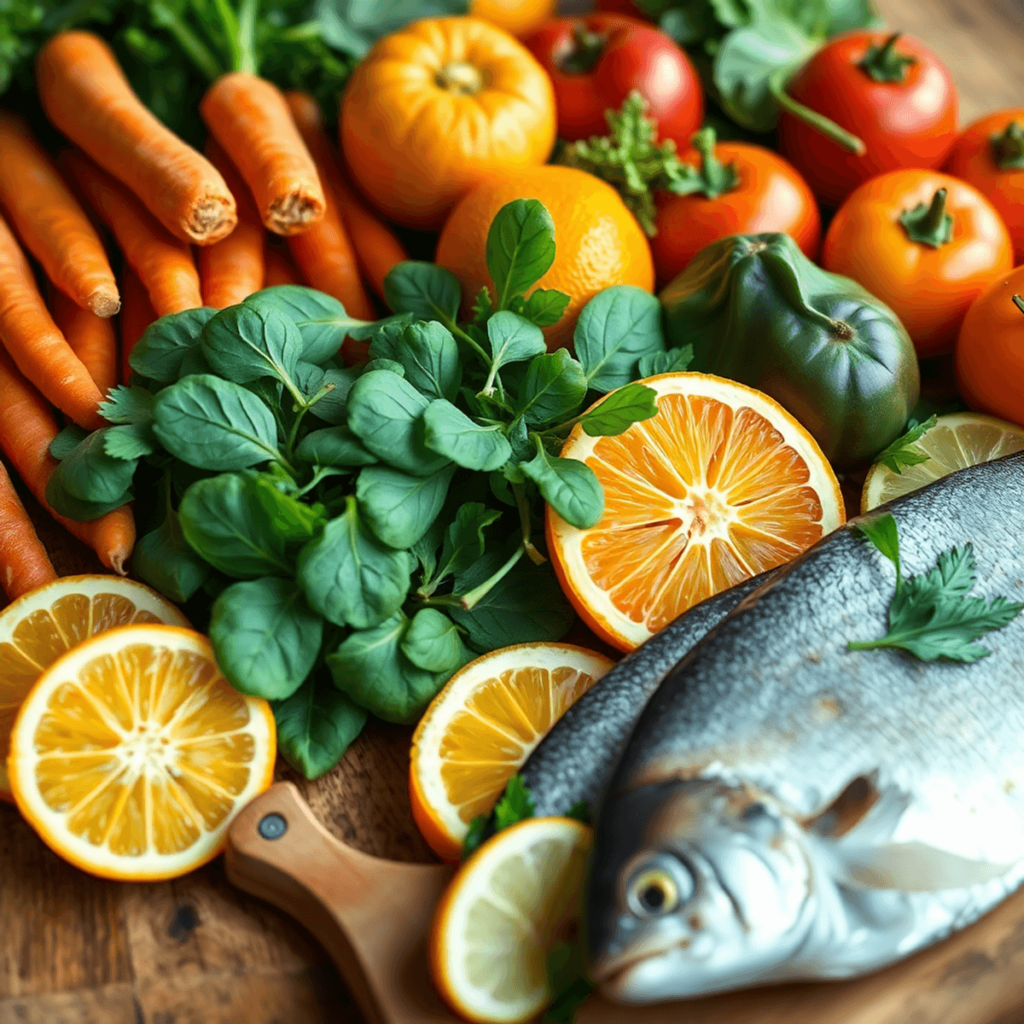Your eyes are amazing organs that need specific nutrients to work their best. Just like your body needs the right fuel to perform well, your eyes rely on essential vitamins, minerals, and antioxidants to maintain clear vision and prevent age-related eye issues.
Studies show that certain nutrients can protect your eyes from harmful blue light, lower the risk of cataracts, and support retinal health. These important nutrients include:
- Vitamin A for night vision
- Vitamin C for lens protection
- Lutein and Zeaxanthin for macular health
- Zinc for retinal function
- Omega-3 fatty acids for eye development
By including specific foods in your daily diet, you can naturally support your eye health and keep your vision clear throughout your life. Making the right nutritional choices can help protect your eyes from common vision problems and age-related decline.
In addition to a healthy diet, regular preventive eye care is crucial for maintaining optimal eye health. This includes routine check-ups and consultations with eye care professionals. If you need to contact an eye care expert, or if you’re considering options such as ordering contacts, don’t hesitate to reach out.
Let’s take a closer look at the essential nutrients your eyes require and the best food sources to obtain them.
The Role of Nutrients in Eye Health
Your eyes require specific nutrients to function optimally and maintain long-term health. Let’s explore these essential nutrients and their food sources to help you make informed dietary choices.
Vitamin A: The Vision Vitamin
Vitamin A plays a crucial role in maintaining your retina’s health and preventing dry eyes. This essential nutrient helps your eyes adapt to light changes and keeps your corneas clear.
Rich sources of Vitamin A include:
- Sweet potatoes
- Carrots
- Spinach
- Beef liver
- Egg yolks
- Butternut squash
Vitamin C: Your Eyes’ Protective Shield
Vitamin C acts as a powerful antioxidant, protecting your eyes from harmful free radicals. Research shows it helps maintain the health of blood vessels in your eyes and reduces the risk of cataracts.
Best Vitamin C food sources:
- Citrus fruits (oranges, grapefruits)
- Bell peppers
- Strawberries
- Broccoli
- Brussels sprouts
- Papaya
Lutein and Zeaxanthin: Natural Eye Protection
These carotenoids work as natural sunblock for your eyes, filtering harmful blue light and protecting your macula from damage. Your body can’t produce these nutrients, making dietary sources essential.
Foods rich in lutein and zeaxanthin:
- Dark leafy greens (kale, collard greens)
- Yellow and orange bell peppers
- Corn
- Egg yolks
- Green peas
- Brussels sprouts
Zinc: Supporting Retinal Health
Zinc helps transport Vitamin A from your liver to your retina and plays a vital role in melanin production. This mineral supports night vision and helps prevent age-related vision problems.
Zinc-rich foods:
- Oysters
- Lean beef
- Turkey
- Pumpkin seeds
- Lentils
- Chickpeas
Omega-3 Fatty Acids: Essential for Eye Development
DHA and EPA, two types of omega-3 fatty acids, support eye development and help prevent various eye diseases, including dry eye syndrome and macular degeneration.
Sources of omega-3 fatty acids:
- Fatty fish (salmon, mackerel, sardines)
- Flaxseeds
- Chia seeds
- Walnuts
- Algae-based supplements
- Fish oil
Vitamin E: Cellular Protection
Vitamin E protects eye cells from free radical damage and supports healthy blood vessels. This fat-soluble vitamin works synergistically with other nutrients to maintain eye health.
Foods high in Vitamin E:
- Almonds
- Sunflower seeds
- Avocados
- Wheat germ
- Hazelnuts
- Plant oils
Additional Considerations for Eye Health
While maintaining a balanced diet rich in these essential nutrients is crucial for optimal eye health, regular check-ups with an eye care professional are equally important. They can provide dilation services to check for any underlying issues that may not be apparent during regular activities.
Hydration: A Key Factor in Maintaining Healthy Eyesight
Your eyes depend on adequate hydration to function properly. Water helps maintain the natural lubrication of your eyes through tear production, preventing uncomfortable symptoms like:
- Burning sensation
- Redness
- Blurred vision
- Eye fatigue
- Light sensitivity
These symptoms can sometimes be indicative of underlying issues that might require eye disease treatment, so it’s crucial to pay attention to them.
Tips to Stay Hydrated for Eye Health:
- Drink 8-10 glasses of water daily
- Set reminders on your phone for regular water intake
- Keep a reusable water bottle at your desk
- Limit caffeine and alcohol consumption
- Add hydrating foods to your diet (cucumber, watermelon, citrus fruits)
The 20-20-20 rule helps prevent eye strain and maintains moisture: Every 20 minutes, look at something 20 feet away for 20 seconds. This simple practice allows your eyes to produce natural tears and maintain proper lubrication throughout the day.
Bonus tip: Use a humidifier in dry environments to add moisture to the air and reduce eye irritation.
In cases where hydration alone doesn’t alleviate discomfort or if you experience persistent symptoms, it may be time to consult with an eye specialist. They can provide advanced solutions such as retinal imaging for a thorough examination of your eye health. Remember, maintaining good hydration is just one aspect of overall eye care, which should also include regular check-ups and following professional advice. For more information on our policies regarding privacy and data handling during these consultations, please refer to our privacy policy.
Maintaining a Balanced Diet for Optimal Vision Support Through Food Choices
A balanced diet is essential for maintaining healthy vision. The food you eat every day has a significant impact on your eye health, helping to prevent age-related vision problems and supporting optimal eye function.
Key Foods for Vision Wellness:
- Leafy Greens: Incorporate spinach, kale, and collard greens into your meals for essential antioxidants
- Colorful Fruits: Add berries, oranges, and grapes to boost your eye-protective vitamin intake
- Lean Proteins: Choose fish, eggs, and lean meats to support eye tissue repair
- Whole Grains: Select brown rice, quinoa, and oats for sustained energy and eye health
- Healthy Fats: Include avocados, nuts, and olive oil for proper nutrient absorption
Including a variety of these foods in your diet will help you maintain good eye function. A balanced diet that is rich in these nutrients supports the health of your retina, reduces inflammation, and protects against oxidative stress. The different compounds in these foods work together to provide comprehensive protection for your vision through natural sources.
Remember to pay attention to portion sizes and have regular meal times to get the most out of these foods that are good for your eyes. This consistent intake of nutrients will help your body absorb and use these important substances efficiently, leading to better eye health.
Supplements: A Potential Aid in Managing Specific Eye Conditions
Dietary supplements play a significant role in managing age-related macular degeneration (AMD). Research indicates specific supplements can slow disease progression and protect vision when diet alone isn’t sufficient.
The AREDS2 formula, developed through extensive clinical studies, includes:
- 500 mg Vitamin C
- 400 IU Vitamin E
- 80 mg Zinc
- 2 mg Copper
- 10 mg Lutein
- 2 mg Zeaxanthin
These supplements show particular promise for individuals diagnosed with intermediate or advanced AMD. Studies demonstrate a 25% reduction in AMD progression risk among patients taking these supplements regularly.
However, it’s crucial to remember that dietary supplements should not be seen as a standalone solution. They work best alongside a nutrient-rich diet and regular eye examinations. For instance, routine preventive eye care is essential for maintaining overall eye health and managing conditions like cataracts and macular degeneration.
Before starting any supplement regimen, consider the following important points:
- Consult an eye care professional for personalized recommendations, especially if you’re dealing with conditions like AMD or cataracts, which require careful evaluation and management.
- Check for potential interactions with existing medications.
- Choose high-quality supplements from reputable manufacturers.
- Monitor your response and any side effects.
- Maintain regular eye examinations while taking supplements.
Dietary supplements can aid in managing specific eye conditions but should always be used in conjunction with a healthy diet and under professional guidance.
Adopting Lifestyle Practices to Further Support Eye Health
Your eye health extends beyond nutrition – protective measures play a crucial role in maintaining optimal vision. Here’s what you need to know about safeguarding your eyes:
UV Protection: Your First Line of Defense
Sunglasses serve as more than a fashion statement – they’re essential armor for your eyes. UV radiation can cause:
- Cataracts development
- Macular degeneration acceleration
- Corneal sunburn
- Premature aging around the eyes
Choosing the Right Sunglasses: When selecting sunglasses, consider these tips for optimal protection:
- Look for 99-100% UV protection
- Select wraparound styles for complete coverage
- Wear them year-round, even on cloudy days
- Consider polarized lenses to reduce glare
Regular Eye Exams: Your Vision Safety Net
Professional eye examinations detect potential issues before they become serious problems. These check-ups can identify:
- Early signs of eye diseases
- Changes in vision prescription
- General health conditions affecting your eyes
- Eye strain from digital devices
Recommended Eye Exam Schedule: To keep your vision in check, follow this recommended eye exam schedule:
- Adults (18-64): Every 2 years
- Adults (65+): Annually
- Contact lens wearers: Yearly
- People with existing eye conditions: As advised by your eye care professional
Additional Protective Measures
To further support your eye health, consider implementing these additional protective measures:
- Take regular breaks from digital screens (20-20-20 rule)
- Maintain proper lighting while reading or working
- Keep your eyes clean and avoid rubbing them
- Wear protective eyewear during sports or hazardous activities
Remember: Your eyes work hard every day – protecting them should be part of your daily routine. Combined with proper nutrition and regular check-ups, these protective measures help ensure your eyes stay healthy for years to come. For more insights on eye care, feel free to explore our blog. Additionally, if you’re looking for high-quality eyewear options, check out our extensive range available at Eye Envy Optical.
FAQs (Frequently Asked Questions)
Why is nutrition important for maintaining healthy eyes?
Nutrition plays a crucial role in eye health by providing essential nutrients that support vision improvement, protect eye cells, and prevent eye diseases. Key nutrients like Vitamin A, C, E, lutein, zeaxanthin, zinc, and omega-3 fatty acids contribute to retina health, antioxidant protection, and macula support.
Which foods are rich in Vitamin A and how do they benefit eye health?
Foods rich in Vitamin A such as carrots, sweet potatoes, spinach, and kale are vital for retina health and preventing dry eyes. Vitamin A supports the functioning of the retina and helps maintain clear vision.
How do antioxidants like Vitamins C and E help protect the eyes?
Vitamins C and E act as antioxidants that protect the eyes from oxidative stress and damage caused by free radicals. Vitamin C supports overall eye protection while Vitamin E maintains cell health within the eyes.
What role do lutein and zeaxanthin play in supporting vision?
Lutein and zeaxanthin are carotenoids that provide macula protection by filtering harmful blue light and reducing oxidative damage. Consuming foods like leafy greens and eggs can boost these nutrients to support healthy vision.
How does hydration affect eye health?
Proper hydration is essential for preventing dry eyes and maintaining optimal eyesight. Staying well-hydrated ensures sufficient moisture in the eyes, reducing discomfort and supporting overall eye function.
What lifestyle practices can further enhance eye health besides nutrition?
In addition to a balanced diet, protecting eyes from UV damage by wearing sunglasses, scheduling regular eye exams for vision check-ups, and managing specific conditions with supplements can significantly support long-term eye health.



